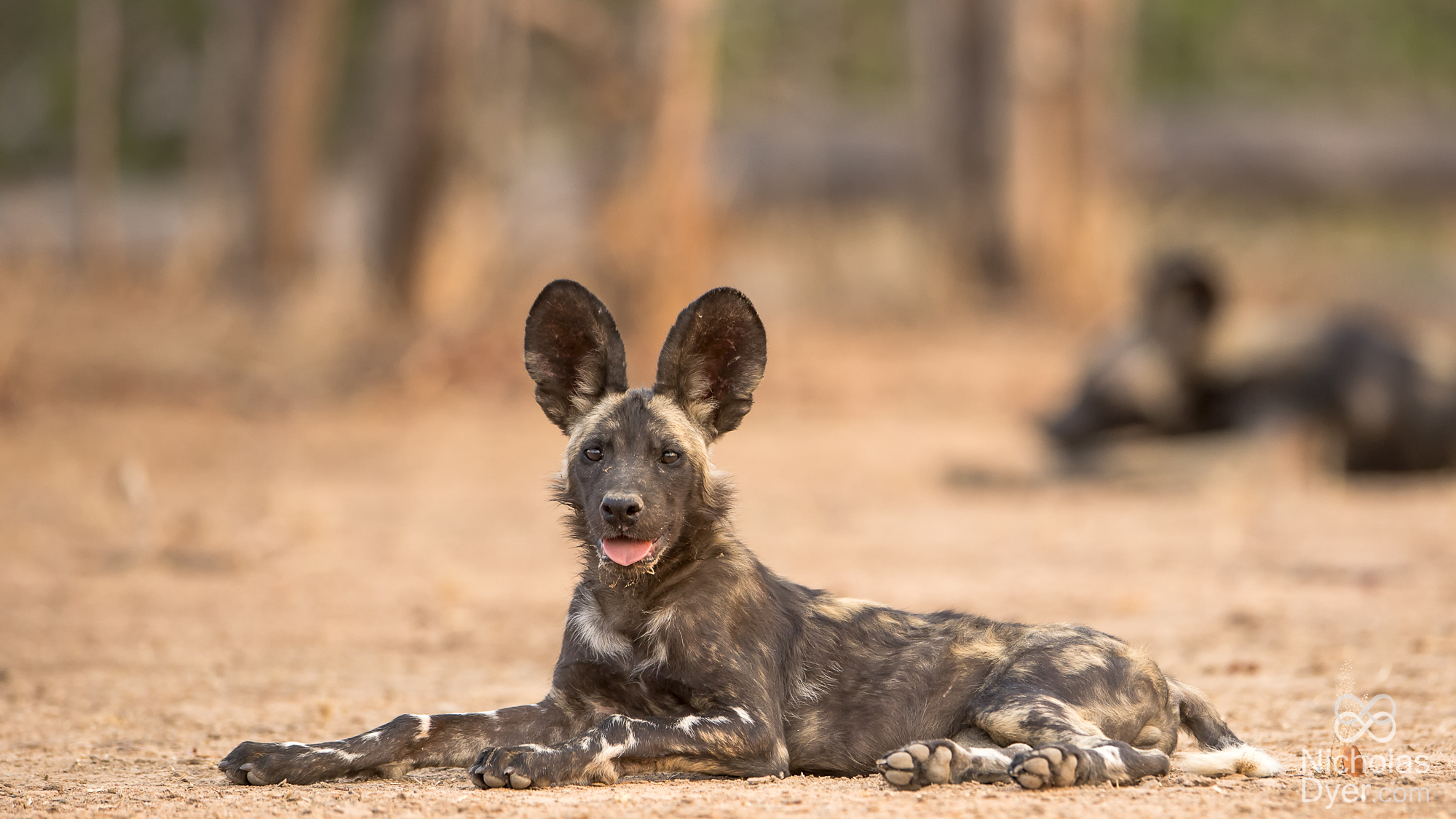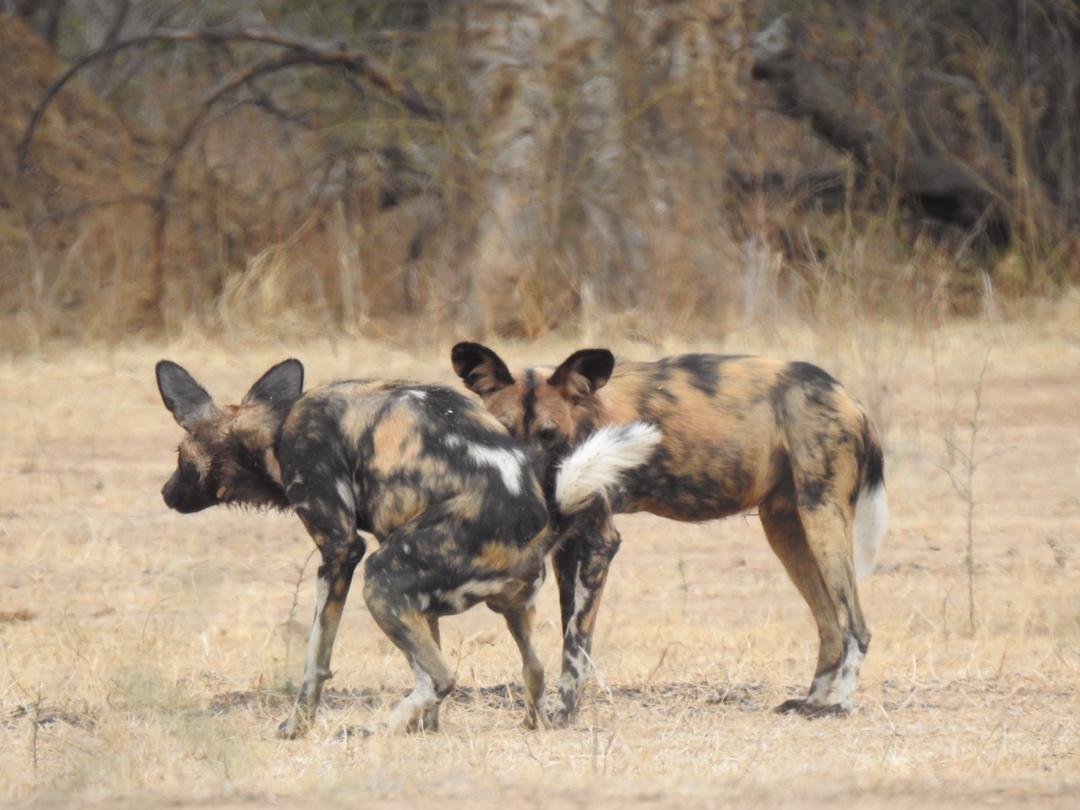
News Updates
Education – getting back to normal, saving painted dogs through education
Our Iganyana Children’s Bush Camp resumed its programs smoothly following the holidays and the relaxing of COVID-19 regulations. We had eight schools coming to the Bush Camp for the free-of-charge camps for the period of July-September making a total of 24 camps so far this year.
Our Iganyana Children’s Bush Camp resumed its programs smoothly following the holidays and the relaxing of COVID-19 regulations. We had eight schools coming to the Bush Camp for the free-of-charge camps in the period July-September, making a total of 24 camps so far this year.
The Ngamo kids were very excited, as they thought the camp had eluded them, as had happened for the 2020 kids, who missed their camp due to the pandemic.
The “Special Camp”, which brings the best-performing students from each school, back to the Bush Camp for the season finale, will be conducted again this year before schools close in December.
Complimentary to our education program is our university sponsorship program, which aims to create local role models for kids and communities, to look up to. The program funds deserving and/or underprivileged students who have attended our Children’s Bush Camp, to pursue their studies at the university level. We are looking at establishing a Scholarship Fund that you can contribute to and help sustain this critical intervention.
A case in point is Survivor, not only is he one of our anti-poaching unit scouts but he is also a graduate of our Children’s Bush Camp. He is studying Bachelor’s Degree in Film, Television and Media Studies at Lupane State University. He has committed to using his profession to profile conservation issues and create awareness of such. The objective on our end is that sponsored students take up key posts and leadership roles in wildlife conservation, prompting local people to appreciate wildlife and the environment more.
Student Profile
Name: Survivor Nyasulu
Current Occupation: Anti~Poaching Scout
Field of Study: Bachelor’s Degree in Film, Television and Media Studies
Length of Program: 4 years
Institution: Lupane State University
Future Prospects: Wildlife Documentaries, Photography and Podcasts
How do you see your study contributing to creating an environment where painted dogs can thrive?
Answer: “Firstly, media is a very powerful means of communication. We're living in an advanced world where the media controls everything. For instance, in the case of radio, Radio has the ability to reach remote areas. A good example, on the 4th of October 2022 l got a call from a listener in Solusi, after (they listened to) my radio show, they said they had sighted a PANGOLIN. I got in touch with ZIMPARKS who then headed there and recovered it.
Media is also equipping me with the necessary skills to tell stories through the lens, stories of the plight of painted dogs, that will be seen by many, and also help in engaging with many people in protecting the painted dogs, I am happy that I live with these animals and I can tell the stories”
Notes from the Field: The new pups of Mpindothela and the ‘no pups’ of Nyamepi
The long tale of the Mpindothela pack continues. This time it takes a good turn, successfully emerging out of the den with five well-nourished pups. This is the first litter of the troubled Mpindo pack survivors and Mathathela males who joined and formed the Mpindothela pack.
The long tale of the Mpindothela pack continues. This time it takes a good turn, successfully emerging out of the den with five well-nourished pups. This is the first litter of the troubled Mpindo pack survivors and Mathathela males who joined and formed the Mpindothela pack.
You will recall that the four surviving Mpindo females were released in August last year to join the four Mathathella males. We expected some coexistence issues but the response from the community was also as we hoped for and they tolerated the few instances of predation, actually blaming the livestock owners who suffered the predation for not looking after their livestock properly. As a unit, the communities rallied around and simply chased the dogs away rather than seek retribution. Today the pack have pups, illustrating the long-term behaviour change that we are seeking that will sustain the coexistence of wildlife and people.
In Hwange, poaching through wire snares remains one of the main threats to painted dogs. And through your help, we are meeting this head-on. The Mpindothela pack pups will be a great addition to the painted dog population of Hwange if they can make it through the next challenging months and reach adulthood. Our team is working hard to minimize any human-induced threats to the pack, which continues to occupy an area we know is a poaching hot zone.
Mana Pools, on the other hand, has a different set of problems for the endangered painted dogs, highlighted by the case of the Nyamepi pack this denning season.
The Nyamepi pack alpha female, called Whisky, gave birth to a litter of pups on September 16th or 17th. We saw her, heavily pregnant, on September 14th. We counted the days from when we had seen her mating on July 9th and knew the day was very close (painted dogs have a gestation period of 69/70 days).
On Monday 19th, Whisky spent the entire day and night away from the den with the rest of the pack. Boas, the alpha male, was hoo-calling a lot. This haunting call, a unique feature of the painted dogs, is a sign of a pack mate or mates missing. We were concerned because the alpha female spends almost all her time inside the den with her newborn pups at this stage. We wondered if lions had “raided” the den and chased Whisky away. If lions or something else comes to the mouth of the den she would be terrified, trapped inside. As soon as the coast is clear, she would flee to preserve her life above anything else.
Early on Tuesday 20th, the pack returned to the den. However, we could not locate them that evening.
By Wednesday 21st, we knew something terrible had happened to the pups because the entire pack again spent the day more than 2km from the den and never returned. It became apparent that the Nyamepi pack were already back into their nomadic ways. After intensive searching, we located the pack again on 4th October at Little Ingwe, which is about 10km from the original den site. The sighting confirmed once and for all that they were not denned and so the pups had perished, just a few days old.
The pups could have died of natural causes. It is very unusual for painted dogs to den so late in the year in Zimbabwe, however, there are enough recorded cases of such an unusual event happening. The usual denning season is June through to the end of August to early September. Or, had some disturbance caused Whisky to abandon her pups? On the latter, we continue to engage authorities to enforce the code of conduct agreed on in these areas regarding human behaviour around wildlife. We want people to see painted dogs, it serves them well in the long-term endeavour to protect the species, but if we smother them during the denning season in particular or disturb their hunts, we are not serving them well and the rate of recruitment will decline to pose a threat to the numbers. Every individual counts and we ought to protect each and every one of them together.
The power of sport – awareness and conservation practice
As we all started to get our lives back under the new normal post-COVID-19, with people being allowed to gather in numbers again, we felt the need for some rigorous outreach to the local communities to catch up and address issues of poaching, a worrying concern that we had seen induced by the lockdowns of the pandemic period.
As we all get back to our lives under the new normal post-COVID-19 and with people being allowed to gather in numbers again, we felt the need for some rigorous outreach to the local communities to catch up and address issues of poaching in particular, which has taken a worrying turn for the worse, induced by the lockdowns of the pandemic period. With support from Tusk, on the 9th of August 2022, we conducted an awareness campaign in Lupote, one of the communities on the boundary of Hwange National Park. We made sure it coincided with the Jane Bubear Sports Foundation (JBSF) sponsored Heroes Day Soccer Tournament final, being held in Lupote, which was organized by our co-sponsored Rhino Cup Champions League Zimbabwe - Iganyana Division with Wild and Free Foundation, and we brought in ZimParks, Forestry Commission, ZRP, Lupote Clinic and local leadership.
Together we mobilised more than 1000 people whom we entertained with a quiz competition (amongst other activities) and delivered an important message to conserve our fauna and flora. It was no surprise that most of the quiz prizes were scooped by kids who had gone through our Iganyana Children's Bush Camp!
Sport and wildlife conservation coming together is perhaps one of the most effective ways to engage with local communities and raise awareness. We are glad the soccer league has taken a centre stage in the community, reaching out to all ages from diverse communities and backgrounds.
The Conservation Award
Beyond the pitch, we encourage teams in our league, to engage in conservation activities such as tree planting, clean-up litter campaigns, and gulley reclamations, to name a few, in their communities. We encourage them to lead by example and teach their communities to live in harmony with nature. To this effect, we introduced the Conservation Award.
The award recognises a team or teams that have engaged in the most conservation activities in their community during the league season. This year’s inaugural award went to Chezhou’s Zebras FC. The team did not only do some of the prescribed activities but also went on to bring a new dimension by patrolling their community boundary as a team targeting and removing wire snares. Coincidentally, the Zebras FC are at the top of the league table! Painted Dog Conservation directly funded this award.
Our appeal is to have a dedicated sponsor to help support this award moving forward as we create an environment where not only painted dogs, but people and the rest of wildlife can thrive. A total of US$1000 annually would take care of this program.
Anti-poaching – a lifeline for wildlife
Anti-poaching units are the first line and direct protectors of wildlife. Painted Dog Conservation anti-poaching scouts go out in the wild every day to remove wire snares set by poachers.
Anti-poaching units are the first line of defence and direct protectors of wildlife. Painted Dog Conservation anti-poaching scouts go out in the wild daily to remove wire snares set by poachers. During our third quarter, we recorded soaring poaching incidents. A total of 542 patrols resulted in the recovery of 1524 snares between July and September 2022. A steep upward trend compared to the same time in the previous years. Last year’s poor rainfall could have caused the surge in poaching.
We swiftly countered the soaring poaching by increasing the boots on the ground. When they go big, we go bigger, thanks to our collaboration with the Mabale Community Anti-Poaching Unit we swarmed the poaching hot spots.
The Gwayi Patrol
The Mpindothella pack moved 13 Km from a safe denning area into a poaching hot zone and one of the females (Thinnet) was missing. We needed to act quickly; our Anti-Poaching Unit is normally denied access to patrol these areas since they are hunting farms. However, with the pack denning there, we consulted with the farm owners and our scouts were allowed to go in, pausing hunting activities for a while. Enock Zulu, the Anti-poaching Unit Manager, deployed all his available manpower at camp. We already had 15 MCAPU scouts deployed and he enlisted the help of an additional 20, who were on standby. Together with our six regular PDC team scouts, Zulu had 41 scouts on the ground.
This effort resulted in 412 wire snares being removed within the proximity of the Mpindothela pack den.
Meanwhile, the research team, headed by Jealous, kept a daily watch on the pack’s movements. Eventually, the surviving three adults and five pups moved south to a relatively safer but certainly not safe area, and we continue to monitor them as we write. We have also extended the collaboration with the MCAPU for another month. This is the kind of life-saving work you support.
Notes from the Field: Denning and Inbreeding
The tale of the Mpindothela has taken a better twist this time around. Clara, the pack's alpha female, now has pups, and the pack is denning. The Mpindothela pack is a merger of the four males from the Mathathela pack, which used to roam near our headquarters in Dete and the four remaining females of the notorious Mpindo pack.
Clara earlier in the year
The tale of the Mpindothela has taken a better twist this time around. Clara, the pack's alpha female, now has pups, and the pack is denning. The Mpindothela pack is a merger of the four males from the Mathathela pack, which used to roam near our headquarters in Dete and the four remaining females of the notorious Mpindo pack. The pack formed when we released the Mpindo females to join the waiting males outside our Rehabilitation facility last year.
Looking back, since the pack was formed, the Mpindothela lost its alpha male Khule to a lion attack and a promising female MaDube to a road accident. Their future looked bleak following these incidents. The pack regrouped well, and now with pups comes new hope for the pack and the painted dog population in Hwange.
Pregnant Clara feeding with her pack
In Mana Pools, Boas, the son of Taku and Tafara (born 2020) of the Rucomecci pack, has joined the Nyamepi pack with a male we believe to be his brother, Dickson. In the video below shot by our researchers in Mana Pools, Boas and alpha female Whisky are mating.
Boas and Whisky Mating
While, on the one hand, it's good to see "new" males join the Nyamepi pack after the disappearance of alpha male Gamma in early May and the other four males, it is still a concern because Taku and Whisky, are sisters. So Boas is a close relative, indeed nephew of Whisky.
This continues a worrying trend in Mana pools of an apparent lack of "new blood" migrating into the area.
Boas and Whisky

























